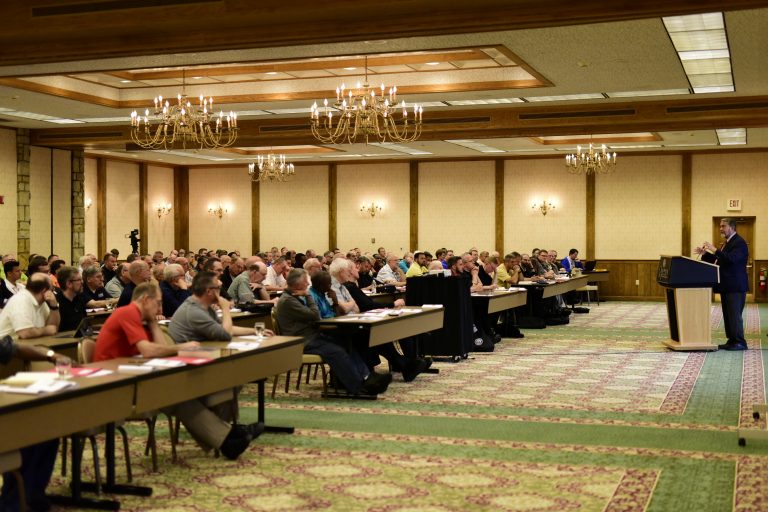
In his Letter to the Romans, St. Paul proclaims that he is not ashamed to proclaim the Gospel of God concerning His Son Jesus Christ (Romans 1:3, 16).
It’s an odd way to begin an epistle. In a talk given to over two hundred priests at the St. Paul Center’s 2018 East Coast Priest Conference, Dr. Scott Hahn called this the Gospel of Sonship—which he says is synonymous with salvation.
Of all the Apostles, Paul places the most emphasis on the idea of the Church as the family of God. Why is this? Paul is the one who got this message most clearly, when, as Saul the persecutor of the Church, God asked him, “Saul, Saul, why do you persecute me?” (Acts 9:4—emphasis added). God reveals to him that in persecuting the Church, he is persecuting God Himself. Once the zealous persecutor of the family of God, Paul becomes one of its greatest preachers. It is Paul who focuses on the Gospel of Sonship, because, as Dr. Hahn says, sonship is the Gospel.
“Family is the universal hermeneutic by which we come to being, because uncreated Being is Abba, Father, eternally.”
The Incarnation reveals this. Dr. Hahn explains that in the Old Testament God is rarely called a Father. He is called Elohim, or the deity, 2,600 times, the LORD God 7,000 times, but Father only 17 times. It takes the Incarnation of the Son to reveal who God is from all eternity: although not obvious in the Old Testament, from all eternity God is a Father because He is fathering the Son.
And it is as family that we truly understand who God is and who we are. God’s plan of salvation is familial. As children of God, we are brothers and sisters called to help others return to the Father.
Paul didn’t only write about the Gospel of Sonship, he lived it out. In his friendship with St. Luke, he lived out God’s plan for what it means to be brothers in Christ.
Dr. Hahn calls this friendship between Paul and Luke “the dynamo that fueled the expansion of the early Church.” Because of their friendship, Paul and Luke accomplished more than either could on their own—together penning more than half the New Testament and authentically sharing what it means to be in the family of God.
“This is the power and purpose of friendship in God’s plan,” says Dr. Hahn. “This is the deep meaning of what it is to be members of the family of God.”
This statement is familiar to our ears today, but, in the early Church, claiming to be in the divine family was unthinkable. Which explains the other emphasis of Romans—that Paul is not ashamed of the Gospel. Dr. Hahn points out that Paul’s odd statement in Romans 1:16 actually reveals how outrageous it truly is to claim to be children of God—a claim we can only make because God stooped down to lift us up.
It is a claim that carries weight, for as children of God, we have a dignity that makes sin below us, even sins that we desire. Just as many early Christians in Paul’s time were ashamed to proclaim the unpopular truth that base pleasures were beneath human dignity, we live in a time where it is tempting to water down truth so as not to alienate others. It is easy to begin rationalizing accepting lesser goods in place of higher goods in order not to offend others, but we then reject the truth that we are sons and daughters made for divine life.
When we live up to the call to be children of God, we reject the lie that earthly goods are good enough. In Romans, Paul calls us to proclaim that each of us, as a child of God, has a dignity worth a higher good, even when we ourselves fail to recognize it. And this higher good is full communion with God in heaven.
This article was adapted from an original talk given by Scott Hahn at the St. Paul Center’s 2018 East Coast Priest Conference. Watch the talk in full on Facebook.
Held July 16–19 at Oglebay Resort and Conference Center in Wheeling, West Virginia, the St. Paul Center’s 2018 East Coast Priest Conference drew over two hundred priests from over thirty-five states and eight countries. The conference featured three speakers: Dr. Scott Hahn, who holds the Father Michael Scanlan Chair of Biblical Theology at Franciscan University of Steubenville; Dr. John Bergsma, professor of theology at Franciscan University; and Dr. Brant Pitre, scholar at the Augustine Institute. In addition to discussions from renowned scholars, the conference featured daily Mass and Confession, as well as time for rest and relaxation.
The 2019 West Coast Priest Conference will be held January 7–10 in La Jolla, California. The 2019 East Coast Priest Conference will be held July 15–18 in Wheeling, West Virginia. For more information, visit our conferences page.